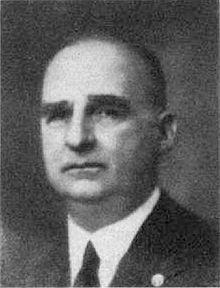Hermann Kriebel
This article needs additional citations for verification. (June 2021) |

Hermann Kriebel (20 January 1876 in Germersheim – 16 February 1941 in Munich) was a lieutenant colonel and former Bavarian staff officer.

Life
[edit]He fought with the Freikorps during the German Revolution of 1918–19. As a member of the German 1919 Armistice delegation, his parting words were "See you again in 20 years."[1] In 1923 he became the military leader of the Kampfbund, the league of nationalist and fighting societies that included Adolf Hitler's Nazi party and SA; the Oberland League; and Ernst Röhm's Reichskriegflagge. Kriebel was, with Hitler and Erich Ludendorff, the key figure in the 8–9 November 1923 Beer Hall Putsch and was convicted with Hitler in 1924, serving his sentence at Landsberg Prison.
After his release from prison, he maintained his ties with the Nazi Party and the Oberland League. He became the German consul general in Shanghai.
In 1929, he arrived in China to work as an arms dealer and an adviser to the Kuomintang government of Chiang Kai-shek.[1] Besides fighting the Chinese Communists, the Kuomintang regime was at the time fighting the armies of Chinese warlords, namely General Feng Yuxiang in the north and the Guangxi clique of General Bai Chongxi and Li Zongren in the south.[1] Accordingly, as China had hardly any arms manufacturing factories of its own at the time, arms had to be imported.[1] Kriebel found that the demand for arms in China was enormous, making the work of an arms dealer very profitable.[1]
References
[edit]Books and articles
[edit]- Fenby, Jonathan (2004). Chiang Kai Shek: China's Generalissimo and the Nation He Lost. New York: Carroll & Graf. ISBN 0786714840.
External links
[edit]- Information about Hermann Kriebel in the Reichstag database
- Newspaper clippings about Hermann Kriebel in the 20th Century Press Archives of the ZBW
- 1876 births
- 1941 deaths
- 20th-century Freikorps personnel
- Collaborators who participated in the Beer Hall Putsch
- Consuls in Shanghai
- German Army personnel of World War I
- German diplomats
- Members of the Reichstag 1924
- Members of the Reichstag 1938–1945
- Military personnel of Bavaria
- National Socialist Freedom Movement politicians
- Nazi Party officials
- Nazis convicted of crimes
- People convicted of treason against Germany
- People from Germersheim
- SA-Obergruppenführer
